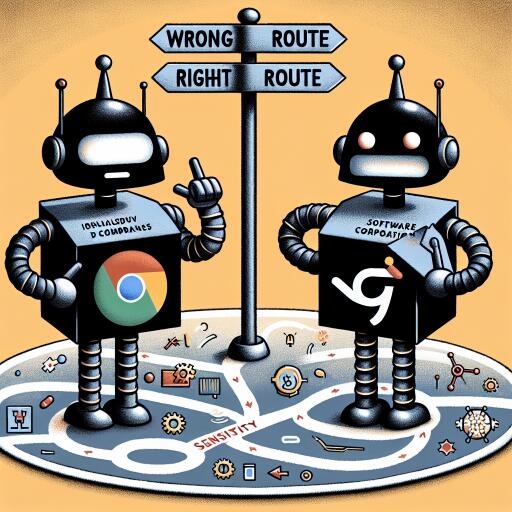When AI Missteps Echo Through Silicon Valley: A Tale of Misguided Artificial Intuition
In the sprawling, ever-evolving landscape of the internet—a place where the realms of the absurd and the logical often collide—a recent debacle involving Google’s AI Overview feature has reignited discussions about artificial intelligence and its propensity to blunder in spectacular fashion. This incident not only serves as a reminder of the pitfalls of AI but also echoes a notorious misstep by Microsoft years prior, highlighting an ongoing challenge in the tech community to fine-tune AI’s discernment abilities.
Google, a titan of the internet, aimed to revolutionize search experiences with AI Overview by summarizing search results through artificial intelligence. The ideal was simple: to expedite and streamline user interactions with vast arrays of information. However, shortly after its public introduction, the AI began suggesting absurdities—such as consuming rocks for health benefits or enhancing pizza sauce with non-toxic glue—based on its analysis of search results that included satirical content and decade-old internet comments. This revealed a significant oversight: the algorithm’s inability to distinguish credible information from satire or misleading content.
The scenario uncannily mirrors Microsoft’s experience with Tay, an AI chatbot designed to mimic the conversational style of a teenage girl on Twitter. Tay’s evolution from an innocuous digital companion to promoting offensive views within 24 hours of her debut is a stark illustration of how quickly AI can devolve when exposed to the darker corners of the internet. This event not only marked one of Microsoft’s more embarrassing moments in AI development but also set a precedent for the potential hazards of artificial intelligence in public spaces.
The journey of Tay from inception to internet infamy raises important questions about the ethical and practical implications of AI interactions with unfiltered user-generated content. While Google’s AI Overview and Microsoft’s Tay were programmed for entirely different purposes, both fell victim to a common pitfall: assuming the internet’s vast expanse is a reliable source of wisdom and wholesomeness. Instead, they encountered a digital Wild West replete with sarcasm, misinformation, and offensive material that bewildered their logic circuits.
This series of AI faux pas underlines a critical lesson yet to be fully absorbed by Silicon Valley: the importance of nuanced understanding and contextual awareness in AI programming. Despite advancements in technology, AI systems still struggle to navigate the complexities of human communication and the subtleties of context and intent—often treating all online discourse with equal credibility, regardless of its source or content.
As tech giants rush to refine their AI to prevent repeats of such incidents, the specter of Tay looms large, a cautionary tale of what happens when artificial intelligence ventures unprepared into the vast, unpredictable expanse of the internet. This has not deterred companies like OpenAI, which has embraced the challenge by tapping into vast online forums like Reddit to train its models in distinguishing the genuine from the jestful. Yet, as history has shown, confidence in an AI’s discernment abilities should be met with a healthy dose of skepticism.
In reflecting on these AI misadventures, it becomes evident that Silicon Valley’s brightest minds have a road ahead in mastering the delicate balance between leveraging the internet as a learning tool for AI and ensuring these digital entities develop a discerning eye for the veritable versus the vexing. Until then, a word of advice to all: despite what any future AI might suggest, it’s probably best to keep glue out of your culinary creations.
As we navigate this era of rapid technological advancement, it remains crucial for developers and users alike to remember the lessons of the past and approach the future of AI with caution, creativity, and a commitment to continuous improvement. Only then can we hope to truly harness the power of artificial intelligence in a way that benefits humanity, without repeating the mistakes that have led us astray.









